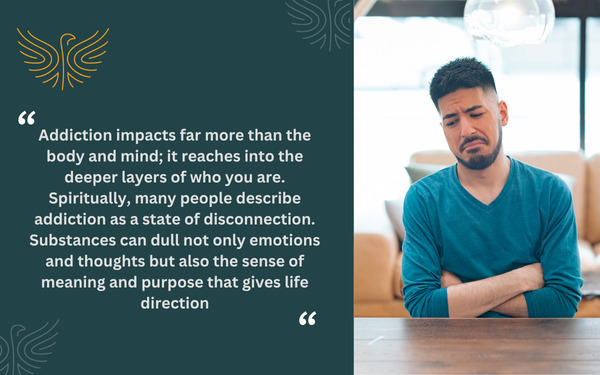Spirituality is often described as the search for meaning, purpose, and connection. For many people, it serves as a guiding compass in life, helping them navigate challenges, celebrate joys, and feel anchored in something greater than themselves. Whether expressed through faith, personal values, nature, or community, spirituality provides a sense of balance and belonging that supports overall well-being.
However, spirituality can be even more important when paving your way toward recovery. This is largely because addiction can slowly disconnect people from what matters most—their values, their loved ones, and their sense of meaning. Without this foundation, the journey through recovery can feel empty or directionless. Yet, by reconnecting spiritually, you may find a renewed sense of hope, strength, and identity.
_______________________________________________________
How Does Addiction Affect You Spiritually?
Addiction impacts far more than the body and mind; it reaches into the deeper layers of who you are. Spiritually, many people describe addiction as a state of disconnection. Substances can dull not only emotions and thoughts but also the sense of meaning and purpose that gives life direction. Over time, this creates a widening gap between who you want to be and how you’re actually living.

In many cases, guilt and shame weigh heavily, leading individuals to believe they are undeserving of love, forgiveness, or inner peace. This sense of unworthiness can make it difficult to reach out for help or even to imagine a life guided by hope.
As aforementioned, addiction also frequently disrupts connections with others. Relationships may be strained or lost, communities may feel distant, and the support systems that once provided encouragement can fall away. For those who once leaned on spiritual or faith traditions, substance use may have created a sense of alienation.
_______________________________________________________
How Spirituality Can Support Recovery
While addiction can leave a spiritual void, recovery offers the chance to rebuild this part of your life in meaningful ways. And it’s worth noting that spirituality doesn’t have to look the same for everyone—it may be rooted in faith, personal values, or simple daily practices. What matters most is how it supports healing and helps create a stronger foundation for lasting change.
So, here are the many ways regaining your spiritual side can support your healing and recovery.
Restoring a Sense of Purpose
Addiction can make life feel empty and directionless. But spirituality can help fill that space by reconnecting you with your values and what truly matters in life. Overall, a sense of purpose offers a guiding light that keeps you moving forward, even when the journey feels hard.
Building Inner Strength and Resilience
The road to recovery is rarely straightforward. There are setbacks, doubts, and moments of discouragement. Yet, spiritual practices—such as prayer, meditation, or simply quiet reflection—offer grounding moments during those times. They create space to step back, breathe, and draw strength from something more profound than the momentary struggle.
For many, this resilience is what keeps them moving forward even when progress feels slow or hurdles happen (and they often do!).
Reducing Stress and Anxiety
Since substances are no longer used to numb or escape, it becomes vital to develop new coping tools. And yes, spirituality can play a role here, too. It provides healthier ways to handle stress, such as through meditation, mindfulness, or even time in nature. These practices calm both body and mind, helping reduce anxiety and prevent the buildup of tension that can lead to relapse.
Encouraging Connection and Compassion
Another powerful way spirituality supports recovery is by rebuilding a sense of connection. Addiction often thrives in isolation, but spiritual growth nurtures compassion for yourself and others.
Ultimately, shared spiritual practices, acts of service, and the recognition of our common humanity all help create a supportive community that eases loneliness and strengthens recovery.
_______________________________________________________
Practical Ways to Reconnect to Your Spiritually
Small, intentional practices can help you rebuild a sense of meaning and peace as you move forward in recovery. And keep in mind that they don’t have to be anything drastic. Some approaches to consider include:
- Journaling for reflection: Writing down your thoughts, emotions, and values can help you make sense of your experiences and clarify what matters most to you.
- Spending time in nature: Walks outdoors, sitting quietly near water, or simply breathing fresh air can provide a sense of calm and perspective.
- Creative expression: Art, music, or writing can serve as outlets for emotions while helping you reconnect with the joy of creating.
- Mindfulness or meditation: Setting aside a few minutes each day to breathe deeply or practice guided meditation helps quiet the mind and build inner peace.
- Service to others: Volunteering or small acts of kindness remind you that you are part of something bigger than yourself, fostering connection and compassion._______________________________________________________
Reclaiming Hope and Purpose
While the physical and emotional aspects of healing are important, nurturing your spiritual identity can provide a deeper source of strength. By reconnecting with purpose, finding healthier ways to manage stress, and opening yourself to compassion and connection, spirituality can help transform recovery from mere survival into a journey of renewal.
If you or a loved one is only at the beginning of your recovery journey and looking for a helping hand, our team at Freedom Recovery Centers (FRC) is here to help. Our caring and compassionate team can walk beside you through each step, ensuring you have the care you need and deserve. Call us at 804-635-3746 to learn more.
.svg)






.svg)

.svg)



.svg)
